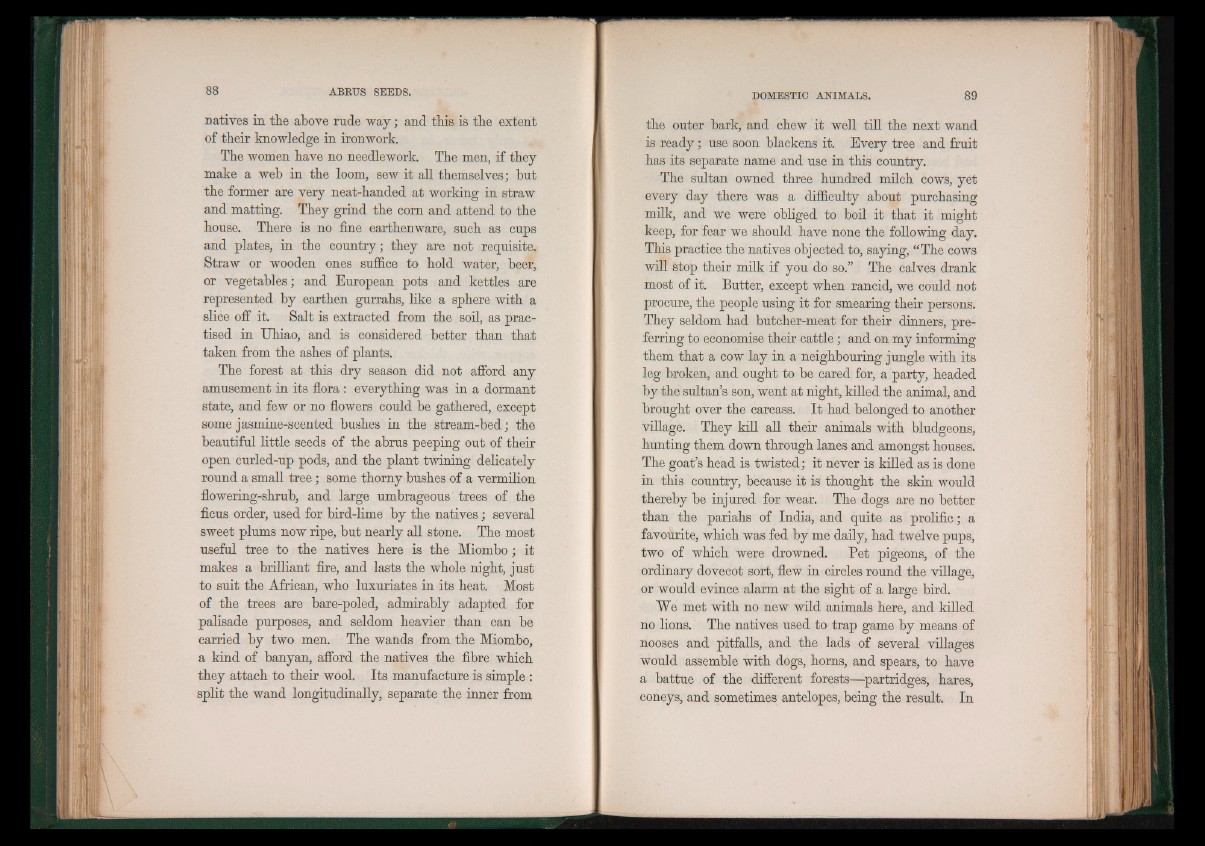
88 ABB.US SEEDS.
Datives in th e above ru d e w a y ; a n d th is is th e ex te n t
o f tb e ir knowledge in ironwork.
The women have no needlework. The men, if they
make a web in the loom, sew it all themselves; but
the former are very neat-handed at working in straw
and matting. They grind the corn and attend to the
house. There is no fine earthenware, such as cups
and plates, in the country; they are not requisite.
Straw or wooden ones suffice to hold water, beer,
or vegetables; and European pots and kettles are
represented by earthen gurrahs, like a sphere with a
slice off it. Salt is extracted from the soil, as practised
in Uhiao, and is considered better than that
taken from the ashes of plants.
The forest at this dry season did not afford any
amusement in its flora : everything was in a dormant
state, and few or no flowers could be gathered, except
some jasmine-scented bushes in the stream-bed; the
beautiful little seeds of the abrus peeping out of their
open curled-up pods, and the plant twining delicately
round a small tree; some thorny bushes of a vermilion
flowering-shrub, and large umbrageous trees of the
ficus order, used for bird-lime by the natives; several
sweet plums now ripe, but nearly all stone. The most
useful tree to the natives here is the Miombo; it
makes a brilliant fire, and lasts the whole night, just
to suit the African, who luxuriates in its heat. Most
of the trees are bare-poled, admirably adapted for
palisade purposes, and seldom heavier than can be
carried by two men. The wands from the Miombo,
a kind of banyan, afford the natives the fibre which
they attach to their wool. Its manufacture is simple :
split the wand longitudinally, separate the inner from
DOMESTIC ANIMALS. 89
the outer bark, and chew it well till the next wand
is ready; use soon blackens it. Every tree and fruit
has its separate name and use in this country.
The sultan owned three hundred milch cows, yet
every day there was a difficulty about purchasing
milk, and we were obliged to boil it that it might
keep, for fear we should have none the following day.
This practice the natives objected to, saying, “The cows
will stop their milk if you do so.” The calves drank
most of it. Butter, except when rancid, we could not
procure, the people using it for smearing their persons.
They seldom had butcher-meat for their dinners, preferring
to economise their cattle; and on my informing
them that a cow lay in a neighbouring jungle with its
leg broken, and ought to be cared for, a party, headed
by the sultan’s son, went at night, killed the an im a l, and
brought over the carcass. I t had belonged to another
village. They kill all their animals with bludgeons,
hunting them down through lanes and amongst houses.
The goat’s head is twisted; it never is killed as is done
in this country, because it is thought the skin would
thereby be injured for wear. The dogs are no better
than the pariahs of India, and quite as prolific; a
favourite, which was fed by me daily, had twelve pups,
two of which were drowned. Pet pigeons, of the
ordinary dovecot sort, flew in circles round the village,
or would evince alarm at the sight of a large bird.
We met with no new wild animals here, and killed
no lions. The natives used to trap game by means of
nooses and pitfalls, and the lads of several villages
would assemble with dogs, horns, and spears, to have
a battue of the different forests—partridges, hares,
coneys, and sometimes antelopes, being the result. In